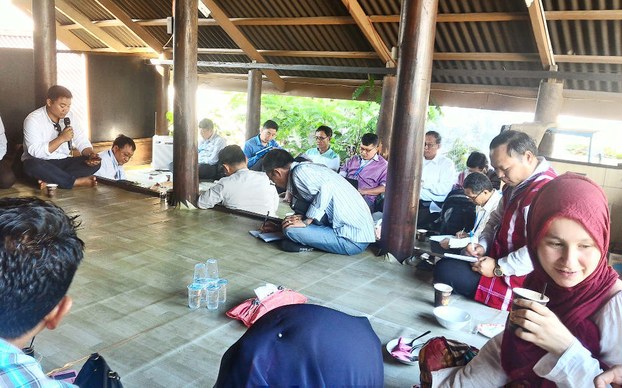Bener News | Nurdin Hasan | 19 February 2016
 A group of 15 Karen rebels from Myanmar spent a week in Indonesia’s westernmost province of Aceh to learn how the region maintains peace after gaining it a decade ago.
A group of 15 Karen rebels from Myanmar spent a week in Indonesia’s westernmost province of Aceh to learn how the region maintains peace after gaining it a decade ago.
During their stay, from Feb. 14 – 20, the group met with academics, government officials, former members of the separatist Free Aceh Movement (GAM), activists and journalists.
“The success of the peace in Aceh is a role model for our region, with a few adjustments, of course. For example, the establishment of a local political party is really interesting and maybe can be discussed” back home, delegation leader Isaac Po told BenarNews.
The 15 represented three subgroups – Karen National Union/Karen National Liberation Army (KNU/KNLA), Democratic Karen Benevolent Army (DKBA), and Karen National Union/Karen National Liberation Army Peace Council (KNU/KNLA PC).
In one session during the week, journalists shared their experience in reporting on gun battles between the Indonesian army and GAM separatists.
“We really had to be independent in reporting the conflict, because if we took a side, the other would be angry,” said Tarmilin Usman, chairman of Aceh Chapter of the Indonesian Journalists Association (PWI).
“Back then, local media always campaigned about the need to end the armed conflict through dialogue. Even a small opportunity for dialogue between the warring parties, we would turn into major news,” he said.
Ceasefire
The government of Myanmar signed a ceasefire agreement with eight groups of rebels, including the Karen, in October 2015, following more than six decades of conflict.
The ceasefire has been going smoothly so far.
“We adhere to the ceasefire agreement and there has been no more armed contact with the military,” Po said. “It is true what some people we met here in Aceh said, bringing a conflict to an end requires negotiation and dialog.”
He added that his group wants to learn how Acehnese achieved lasting peace. They also want to learn about the challenges in maintaining peace.
“We are also interested to know how former GAM separatists transformed from armed freedom fighters to high-level government officials,” Po said.
“We realize we still have a long way to go to achieve peace in our land, but we’re optimistic we can do the same as what Acehnese have done under one condition – no party betray the other,” he added.
Po said the ceasefire in Myanmar occurred as the nation’s politics changed from a military junta that ruled for more than 50 years to a democratic government. Unlike in Aceh, no mediator was involved in the peace talks.
The National League of Democracy landslide victory led by Aung San Suu Kyi in last year’s election created an opportunity for Myanmar to create a democratic leadership. Military influence remains strong, however, as the constitution requires one-fourth of the parliament be filled by members of the military.
Indonesia experienced similar authoritarianism during the New Order era, when former President Suharto ruled with an iron fist for 32 years.
Rebels Met Local Top Leader
The delegations’ visit was facilitated by the Cambodia-based Center for Peace and Conflict Studies (CPCS) and the International Center for Aceh and Indian Ocean Studies (ICAIOS). ICAIOS is a joint research center of three universities – Syiah Kuala University, Ar-Raniry Islamic State University and Malikussaleh University of Lhokseumawe.
ICAOS said the Karen delegation met with Malik Mahmud Al Haythar, known as Wali Nanggroe Aceh, on Tuesday. The Wali Nanggroe is a traditional leader seen as a unifying figure in Aceh.
Malik shared his story about the separatist struggle and peace talks with the Indonesian government that began in 1999. Several agreements made during the process fell through because the parties did not trust one another.
“It was not that smooth, the challenges were there. So it was only in 2005 that peace was realized through negotiations in Helsinki, Finland. The most important thing is mutual trust between the two sides,” he said.
The former GAM prime minister advised the Myanmar group to follow in the footsteps of GAM by sticking to dialogue and negotiations.
“We, the GAM rebels, used to think there was no other way but war. But in reality, there is hope in another kind of solution, through dialogue, that brings lasting peace and benefits to both sides,” he said.
“If you hold talks, you will get support not only from local society, but also the international community. Peace is not just for the Karen rebels, but also for your people,” Malik said.
The delegation also met officials of the Aceh Party and Aceh National Party, two local political parties formed by former GAM separatists, to learn how former armed rebels switched to politics. [Source]
